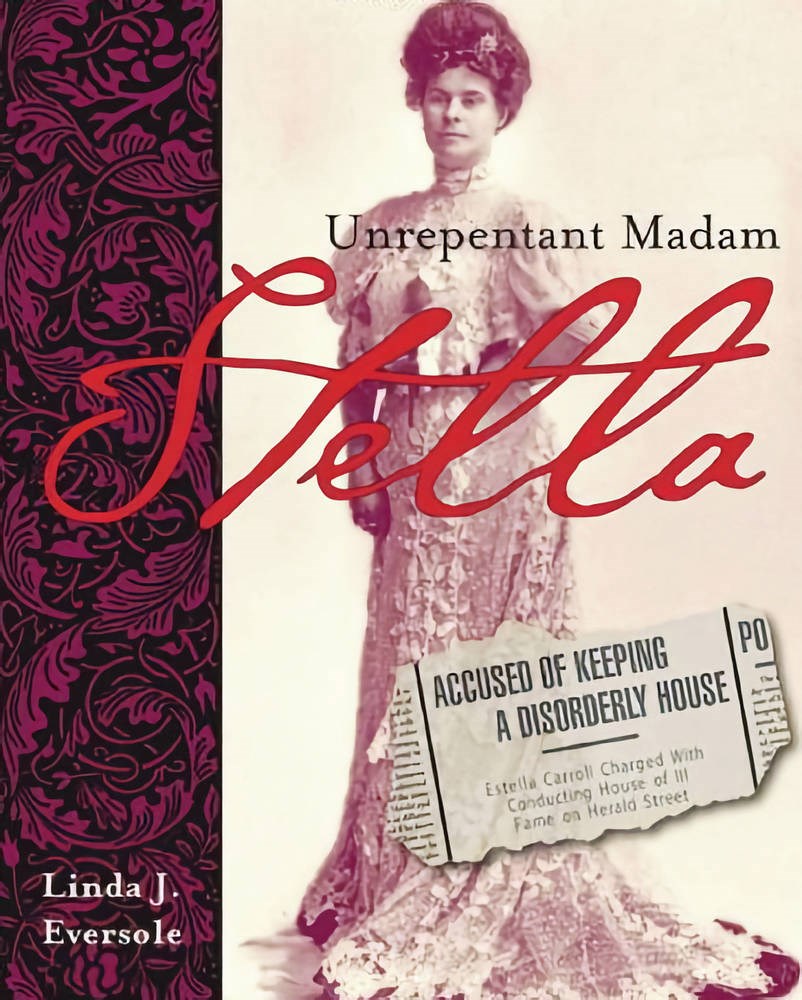I often think that a person’s great successes or tragic failures depend on how their ducks are lined up — the order of the ducks, the number of ducks, when they enter your life.
A fascinating little book arrived in my mail recently titled Stella, Unrepentant Madam by Linda J. Eversole (2005, Touchwood editions) and it’s a fabulous read.
Here’s how Stella’s ducks lined up: She had an elegant mother who loved her very much and had good taste, but died when Stella was only 14. Her father was a drinker, and the family lived in severe poverty in the Ozarks. Stella was extremely astute, intelligent and sexy (and she knew it). She was excellent with finance and business, always yearned to lead a life of luxury and travelled constantly.
Stella was a grand fixture in Victoria at the turn of the last century, famous for her high-class “parlour” brothels, but she was also very shrewd and successful in real estate both here and in the U.S.
This little book has been around for a while and I am so grateful to have finally picked it up to read — what a story! What a lady! It begins with her childhood and trudges slowly across the United States when the great western frontier was booming, opening up with new railway towns, “land grabs,” cowboys, saloons, brothels and wagon trains.
Stella and her young siblings moved to Kansas after her mother died and lived in a sod house that turned to mud when it rained, but even so, the little brother picked some wildflowers and placed them on the rustic little table — it’s a beautiful and sad image, a tribute to her mother’s refinement despite their perpetual poverty in a one-room mud shack.
The book contains an abundance of telling photographs, many of historic Victoria, where Stella settled for most of her adult years. Two images that remain with me are the police mug shots of Stella’s working girls in her Broad Street brothel — they look completely bored, but remain coiffed and dressed in their finery.
Stella’s story is an intriguing read and a different perspective on our city’s history. It is hinted that Broad Street was so named due to the number of brothels (and here I thought it was due to the road’s width).
You will meet the extremely moral Mayor Morley, a perpetual thorn in Stella’s side, the generous Dr. Helmcken, who donated candy and fruit to the prison at Christmas (as did Stella, as well as to the orphanage), and all sorts of colourful but conniving schemers and shysters lurking around town at the turn of the century.
At the grand opening of the Empress Hotel, a rowdy bunch of so-called businessmen from out of town took full advantage of Stella and her brothel, which not only was known for women, but for fine wine and dining amongst chintz sofas and velvet drapes, lace lampshades and polished antiques. After an evening of overeating on the best china, drinking from the best crystal and debauchery in silk sheets, the bunch left, paying with a phoney cheque.
It all sounds very glamorous, but in fact, Stella’s story is quite sad. There is much violence and injustice, some blood-curdling images, despairing moments and even loneliness, perhaps inevitable in such a business, but more than anything, it is a story of survival — survival of one woman’s soul.
Many years ago, my friends Les and Jane and I embarked on a road trip down to the western states. One evening, we pulled into a rough little town to stay the night. Sooty brick buildings lined the gritty treeless streets. We checked into a hotel that, we were to discover, had been a notorious brothel back in its day, and was quite unchanged architecturally — it still had its back “escape exits” for use in the event of police raids.
I recall feeling an overwhelming sort of sad empathy as we walked down a long dim hallway, the old wooden floorboards creaking, and nothing on the white plastered walls in our tiny plain rooms.
Whatever your views are on prostitution and brothels (even high-class “parlour” brothels like Stella’s), you will find this story very entertaining, at times amusing, perhaps even shocking, and likely sad. I found myself rooting for her, but also becoming exasperated with her.
As for the way that Stella’s ducks lined up, her poverty combined with her knowledge of class and taste, her business intelligence aligned with the opening up of the west, her “bawdy humour” came with terrible choices in abusive husbands (she had four!), and British boomtown morality was mixed with her chosen profession.
Stella played the hand that life had dealt her, and she played it with all her might.



